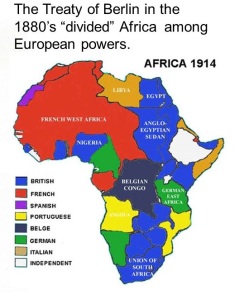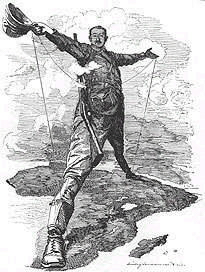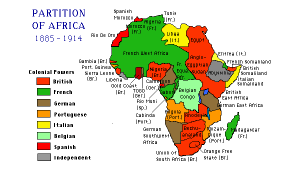
Today I would like to talk about the atrocity which divided Africa in 10,000 pieces… you know, the one known as the Berlin Conference. How the livelihood of millions of lives could be decided by some foreigners at some tables thousands of kilometers away is beyond me! In reality, the Berlin Conference drafted from 1884 to 1885 is still in action today, over 132 years later, and that is why it is important to talk about it today. This conference regulated European colonization and trade in Africa during the New Imperialism period. Organized by Otto von Bismarck, first Chancellor of Germany, its outcome, the General Act of the Berlin Conference, is seen as the formalization of the Scramble for Africa. This conference officialized European colonization, and eliminated or overrode existing forms of African autonomy and self-governance. I print here a selection from the final 1885 Berlin Act from Chapter 1-3, and I will print the rest later.
========
Selections from the 1885 Berlin Act

Her Majesty the Queen of the United Kingdom of Great Britain and Ireland, Empress of India; His Majesty the German Emperor, King of Prussia; His Majesty the Emperor of Austria, King of Bohemia, etc, and Apostolic King of Hungary; His Majesty the King of the Belgians; His Majesty the King of Denmark; His Majesty the King of Spain; the President of the United States of America; the President of the French Republic; His Majesty the King of Italy; His Majesty the King of the Netherlands, Grand Duke of Luxemburg, etc; His Majesty the King of Portugal and the Algarves, etc; His Majesty the Emperor of all the Russias; His Majesty the King of Sweden and Norway, etc; and His Majesty the Emperor of the Ottomans,
WISHING, in a spirit of good and mutual accord, to regulate the conditions most favourable to the development of trade and civilization in certain regions of Africa, and to assure to all nations the advantages of free navigation on the two chief rivers of Africa flowing into the Atlantic Ocean;

BEING DESIROUS, on the other hand, to obviate the misunderstanding and disputes which might in future arise from new acts of occupation…on the coast of Africa; and concerned, at the same time, as to the means of furthering the moral and material well-being of the native populations;
HAVE RESOLVED, on the invitation addressed to them by the Imperial Government of Germany, in agreement with the Government of the French Republic, to meet for those purposes in Conference at Berlin, and have appointed as their Plenipotentiaries, to wit:
Who, being provided with full powers, which have been found in good and due form, have successively discussed and adopted:
- A Declaration relative to freedom of trade in the basin of the Congo, its embouchures and circumjacent regions, with other provisions connected therewith.
- A Declaration relative to the slave trade, and the operations by sea or land which furnish slaves to that trade.
- A Declaration relative to the neutrality of the territories comprised in the Conventional basin of the Congo.
- An Act of Navigation for the Congo, which, while having regard to local circumstances, extends to this river, its affluents, and the waters in its system…, the general principles enunciated in Articles CVIII and CXVI of the Final Act of the Congress of Vienna, and intended to regulate, as between the Signatory Powers of that Act, the free navigation of the waterways separating or traversing several States—these said principles having since then been applied by agreement to certain rivers of Europe and America, but especially to the Danube, with the modifications stipulated by the Treaties of Paris (1856), of Berlin (1878), and of London (1871 and 1883).
- An Act of Navigation for the Niger, which, while likewise having regard to local circumstances, extends to this river and its affluents the same principles as set forth in Articles CVIII and CXVI of the Final Act of the Congress of Vienna.
- A Declaration introducing into international relations certain uniform rules with reference to future occupations on the coast of the African Continent.
And deeming it expedient that all these several documents should be combined in one single instrument, they (the Signatory Powers) have collected them into one General Act, composed of the following Articles:
CHAPTER I
DECLARATION RELATIVE TO FREEDOM OF TRADE IN THE BASIN OF THE CONGO, ITS MOUTHS AND CIRCUMJACENT REGIONS, WITH OTHER PROVISIONS CONNECTED THEREWITH
Article I
The trade of all nations shall enjoy complete freedom….
Article II

All flags, without distinction of nationality, shall have free access to the whole of the coastline of the territories above enumerated, to the rivers there running into the sea, to all the waters of the Congo and its effluents, including the lakes, and to all the ports situated on the banks of these waters, as well as to all canals which may in future be constructed with intent to unite the watercourses or lakes within the entire area of the territories described in Article I. Those trading under such flags may engage in all sorts of transport, and carry on the coasting trade by sea and river, as well as boat traffic, on the same footing as if they were subjects.
Article III
Wares, of whatever origin, imported into these regions, under whatsoever flag, by sea or river, or overland, shall be subject to no other taxes than such as may be levied as fair compensation for expenditure in the interests of trade, and which for this reason must be equally borne by the subjects themselves and by foreigners of all nationalities.
All differential dues on vessels, as well as on merchandise, are forbidden.
Article IV
Merchandise imported into these regions shall remain free from import and transit dues….
Article V
No Power which exercises or shall exercise sovereign rights in the abovementioned regions shall be allowed to grant therein a monopoly or favour of any kind in matters of trade.
PROVISIONS RELATIVE TO PROTECTION OF THE NATIVES, OF MISSIONARIES AND TRAVELLERS, AS WELL AS RELATIVE TO RELIGIOUS LIBERTY
Article VI
All the Powers exercising sovereign rights or influence in the aforesaid territories bind themselves to watch over the preservation of the native tribes, and to care for the improvement of the conditions of their moral and material well-being, and to help in suppressing slavery, and especially the slave trade. They shall, without distinction of creed or nation, protect and favour all religious, scientific or charitable institutions and undertakings created and organized for the above ends, or which aim at instructing the natives and bringing home to them the blessings of civilization.
Christian missionaries, scientists and explorers, with their followers, property and collections, shall likewise be the objects of especial protection.
Freedom of conscience and religious toleration are expressly guaranteed to the natives, no less than to subjects and to foreigners. The free and public exercise of all forms of divine worship, and the right to build edifices for religious purposes, and to organize religious missions belonging to all creeds, shall not be limited or fettered in any way whatsoever….

CHAPTER II
DECLARATION RELATIVE TO THE SLAVE TRADE
Article IX
Seeing that trading in slaves is forbidden in conformity with the principles of international law as recognized by the Signatory Powers, and seeing also that the operations, which, by sea or land, furnish slaves to trade, ought likewise to be regarded as forbidden, the Powers which do or shall exercise sovereign rights or influence in the territories forming the Conventional basin of the Congo declare that these territories may not serve as a market or means of transit for the trade in slaves, of whatever race they may be. Each of the Powers binds itself to employ all the means at its disposal for putting an end to this trade and for punishing those who engage in it.

CHAPTER III
DECLARATION RELATIVE TO THE NEUTRALITY OF THE TERRITORIES COMPRISED IN THE CONVENTIONAL BASIN OF THE CONGO
Article XII
In case a serious disagreement originating on the subject of, or in the limits of, the territories mentioned in Article I, and placed under the free trade system, shall arise between any Signatory Powers of the present Act, or the Powers which may become parties to it, these Powers bind themselves, before appealing to arms, to have recourse to the mediation of one or more of the friendly Powers.
In a similar case the same Powers reserve to themselves the option of having recourse to arbitration….
IN TESTIMONY WHEREOF the several plenipotentiaries have signed the present General Act and have affixed thereto their seals.
DONE at Berlin, the 26th day of February, 1885


Dr Y
Thank you for such great research work and putting it to the fore.
This is great info needed for the freedom of Africa and the world in general.
You see, I do not believe that those imperialist bandits are free themselves.
Look at the curse in which those imperialists have immersed themselves into. They are the only race that is at the depleting end. They can imagine all strategies to populate their continents to no avail. To make ends meet, they adopt the “green card strategy to populate the place.
You see, after the Slave trade, they ushered in the Berlin slaughter house, moved in to the strangling fold through the World bank, IMF and Comptes d’operation in their treasuries where Africans deposit their monies for no returns.
That is making them richer but weaker in population (see UN population projections. With the ill-gotten wealth, they turn to manufacturing self-destructive weapons and polluting their soil and water. Very soon, they will soon disappear through and our great great grand children will take their place despite the fact that they adopted a wicked sterilizing tactics to render our women less fertile
Africa will conquer because it remains the only place with natural habitat on earth. .
LikeLike
Thanks, I totally agree with you. You said it all so well. Africa will conquer.
LikeLike
Thanks for sharing the informative article.
LikeLike
Thanks for your comment Marsha.
LikeLike
A very tragic time for the African continent. Interestingly, even though this conference was held in Berlin, the German “Empire” was comparatively one of the smallest out kof all European nations. The further east in Europe, the less influence those countries had on colonization in Africa.
A strong reason why this program was so popular was, in the words of this document: “the means of furthering the moral and material well-being of the native populations”. Colonization had to be presented in terms of morality, even though by necessity, colonization meant subverting the pre-existing rule of law in another man’s land, seizing his land by force, submitting the indigenous inhabitants to imperial rule (and in some cases, slavery, although by this time, the British had abolished it in their Colonies, and the Americans had abolished it twenty years prior), exploiting another man’s resources and using terror to ensure compliance with this agenda.
None of this, of course, was remotely moral. But in the eyes of the public of Britain, Germany and so on, this was a chance to further their national achievements; for example, the British legal system was implemented in countries like Nigeria (where my parents came from) and Kenya. Not to the benefit of the natives, though, which is why educational access was restricted to those favourable to Colonialism. No point allowing people access to elite institutions if they could then study your laws and use them to undermine the case for Colonialism. Which is precisely what happened. In some ways, World War One and World War Two were a blessing to the colonized nations because they demonstrated that if these people could fight against a foreign enemy successfully (the Nazi’s), they could fight against their Colonial rulers. And so they did. We owe them a huge debt for that, as well as their sacrifice during these two world wars.
LikeLike
Amen Dido. Your comment is very good. Indeed World Wars I and II did create an awakening among colonized people around the globe (not just Africans, but Indians, Vietnamese, etc), who realized that their enemies were not immortal or super powerful, and indeed if they could be united to fight against the Nazis, they could be united to fight for freedom. Now over 50 years after the independence our forefathers fought for, Africans still need to unite to chase away the enemy.
LikeLike
The more I learn about the Berlin Conference the angrier I become. Seeing the actual receipts about that horrific form of imperialism and colonization is sickening. I shudder to think about how many of my ancestors I didn’t even know about were affected directly and indirectly through all of this rampant thievery of Africa.
LikeLike
You said it so well… I could not have said it any better!
LikeLiked by 1 person
Thank you and I’m glad you feel the same way. You probably saw the aftereffects firsthand being in the continent. It’s important to learn about the history, so it won’t be repeated.
LikeLike
When I see how my grand parents suffered, for sure whites never had hospitable feelings, but Whites can comfort us only by supporting Africa’s development since the riches they have, came from Africa. I saw how George Froid was crucified almost like Jesus then I reflect back seeing Mandela being imprisoned for 27 years not only him but almost whoever tried to express nationalism towards his beloved motherland Africa.
LikeLike
Yes Aidan… whoever tried to express nationalism towards his beloved motherland Africa has unfortunately ended up miserably, most often dead
LikeLike
Thank you for this. It’s very useful for my MA thesis.
LikeLike
Glad the article could help with your MA thesis work
LikeLiked by 1 person